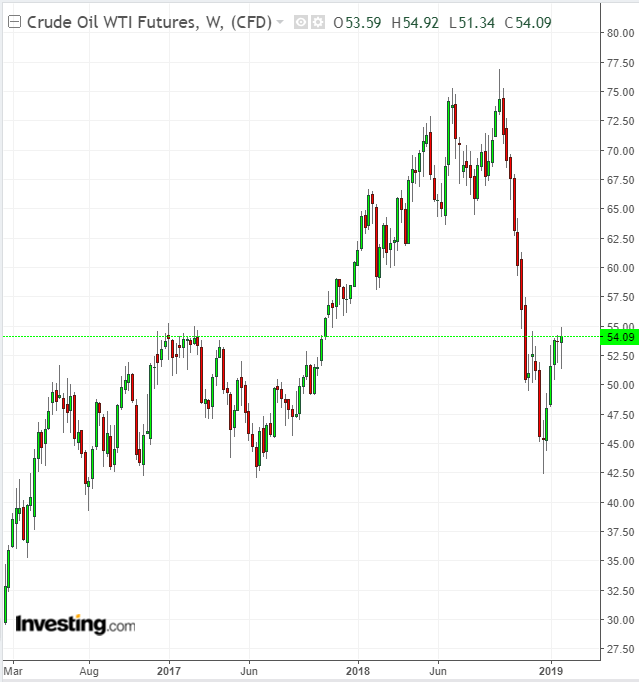The political crisis in Venezuela took a new turn this week when President Trump issued sanctions on Venezuela’s national oil company, PdVSA. The objective of this move is to prevent Nicholas Maduro, whom the United States and many other countries no longer consider the legitimate leader of Venezuela, from benefiting from oil revenue. It is, however, also likely to hit oil supplies and raise gasoline prices in the U.S., as well as impact global oil prices in the medium term.

Technically, the United States is not embargoing sales of oil from Venezuela to the U.S. Rather, the sanctions prohibit companies in the U.S. from transferring payment to the Maduro-controlled government. Refineries can continue to pay for Venezuelan oil, but the money will be held in accounts in the United States, possibly to be transferred at a later stage to a non-Maduro controlled Venezuelan government. In reaction, Maduro has forbidden PdVSA from loading any oil on U.S.-bound ships unless they have received payment in advance. This will effectively halt Venezuelan oil shipments to the U.S, though oil cargoes currently en route will be permitted to proceed normally.
In December, refineries in the U.S. imported about 574,000 barrels per day of Venezuelan oil. The effect of the sanctions on U.S. oil supplies won't be immediate, because shipments on the seas now will be allowed to proceed. But, if the political issues remain unresolved, refineries in the U.S. will feel the crunch in a few weeks. This oil can't be easily replaced with oil produced in the U.S., because Venezuela exports heavy sour crude and the U.S. produces mainly light sweet crude.
The two can't be interchanged in the refining process unless refineries are reconfigured. And while there are other sources of heavy sour crude, such as the Canadian tar sands and various producers in the Middle East, there are logistical and supply impediments to rerouting this crude to refineries in the U.S.
When the Trump administration issued the sanctions, Treasury Secretary Mnuchin said he didn't expect oil supplies in the U.S. to be adversely affected because production in the Middle East will increase to compensate. It is true that Saudi Arabia, Kuwait and the UAE could increase production, but it's extremely unlikely these countries will do so. In fact, Saudi Arabia said that it is decreasing its production to 10.2 million barrels per day in February and that it will be cutting exports to the United States but maintaining shipments to Asia. This could spell trouble for U.S. oil supplies in late February and into March.
However, there are a few factors that will blunt a coming supply crunch in the U.S. The first is that the U.S. has quite a lot of excess gasoline in storage due, in part, to a temporary halt in gasoline exports to Mexico. The second is that refineries in the U.S. will soon begin their regular seasonal maintenance and switchover to summer gasoline blends. Crude oil demand typically drops during this time as refineries in various regions undergo staggered and temporary shut downs. Because U.S. refineries have been running at record levels and gasoline exports have slowed, there are excess gasoline supplies to cushion the impact of the sanctions.
In fact, the supply crunch in the U.S. may mainly be felt by the primary importers of Venezuelan crude. Citgo, Chevron (NYSE:CVX), PBF Energy (NYSE:PBF) and Valero Energy (NYSE:VLO) import significant amounts of Venezuelan crude. These refineries will have difficulty securing alternative sources of heavy sour crude, and it is likely that U.S. consumers will see higher prices and possibly even shortages at the gasoline stations that receive products from these refineries.
Depending on their contracts, the service stations could try to purchase gasoline from other refiners if the Citgo supply is unavailable, but the costs will be higher. Citgo gas stations may be the most adversely impacted because they provide a special branded type of gasoline that they get from Citgo refineries. It is unclear if Citgo stations would need to rebrand and change advertising if they were supplied by alternative refineries.
It is possible that Maduro may relinquish control in the near term, but it isn't likely given that he is receiving support from China and Russia and maintains control over the Venezuelan army. In the probable event that this crisis drags on, oil prices could rise sharply in May. At that point, it becomes likely that the Venezuela crisis and current OPEC production cuts could combine with the end of Iran sanction exemptions, to make oil prices jump.
